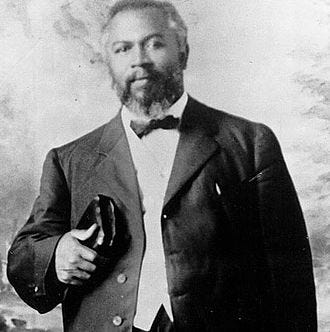Evangelical Revivals in America: How William J. Seymour and the Azusa Street Revival Influenced Evangelical Leadership and Paved the Way for Pure Racial Reconciliation, Past and Present
The Conscious Conservative Pro-life Initiative: Equipping Evangelical Leadership with Tools for Effective Pro-life Outreach and Supporting Black Families with More Empowering Pro-life Choices
The Conscious Conservative Pro-life Initiative, founded in 2025 by Coach Felecia Killings, is a branch of The Felecia Killings Foundation’s national Black Outreach work.
Our mission is to build an alliance between conservative Black American voters and Evangelical leadership in pursuit of pure racial reconciliation and expansion of the conservative voting bloc on a national level.
In addition, we desire to see more empowering pro-life choices available to Black communities nationwide.
Our work of ministry is 100% financed by our Beloved Givers Community, our CCM Leadership Members, and Evangelical Leadership Clients like you.
Evangelical Revivals in America: How William J. Seymour and the Azusa Street Revival Influenced Evangelical Leadership and Paved the Way for Pure Racial Reconciliation, Past and Present
Evangelical revivals have punctuated American religious history, often serving as catalysts for social and spiritual change. These periods of heightened religious fervor and social, political, and economical transformations have reshaped denominations, sparked reform movements, and influenced the nation’s moral compass.
Among the most significant of these revivals is the Azusa Street Revival, a Pentecostal outpouring that began in Los Angeles in 1906. Led by William J. Seymour, a Black American preacher, the Azusa Street Revival uniquely challenged the racial segregation prevalent in American society, albeit with complexities that warrant careful examination.
In today’s empowering post, let’s explore the historical context of Evangelical Revivals in America, delving into the Azusa Street Revival and William J. Seymour’s contributions to racial reconciliation, while also considering the challenges and shortcomings of this movement. Finally, let’s examine how contemporary Evangelical Leaders can learn from Seymour’s experiences to foster genuine and lasting relationships with conservative Black Americans as we seek to expand the conservative voting bloc and foster pure racial reconciliation based on Conscious Conservatism.
The Landscape of Evangelical Revivals in America
American Evangelicalism has been marked by a series of Great Awakenings, each leaving an indelible mark on the religious and social fabric of the nation. The First Great Awakening (1730s-1740s and possibly into the 1770s), driven by figures like Jonathan Edwards and George Whitefield, emphasized personal conversion and piety, challenging established religious authorities. This revival also witnessed increased participation from enslaved Africans, planting seeds for future religious movements within the Black community.
The Second Great Awakening (late 1790s-1830s) further democratized religion, fostering the growth of Methodism and Baptism. It also fueled social reform movements, including abolitionism and temperance. However, despite its emphasis on individual salvation and moral reform, the Second Great Awakening largely failed to dismantle the institution of slavery or address the systemic racism embedded in American society.
The Third Great Awakening (1850s-1900s), coinciding with the Civil War and its aftermath, focused on urban missions and social gospel initiatives. This era saw the rise of figures like Dwight L. Moody, who preached to large crowds and emphasized personal piety. However, the Third Great Awakening also reflected the racial biases of the time, with many Evangelical churches remaining segregated and failing to adequately address the needs of Black communities.
Become a Premium Subscriber to Coach Felecia Killings Omnimedia and Join Our Beloved Givers Community for $25/Month
This Sunday’s reward includes:
The Conscious Conservative Leadership Guide: Homeschool to the Rescue: Teaching Parent Leaders How to Successfully Enter the Homeschool Wonderland (a $25 value)
The Azusa Street Revival: A Pentecostal Explosion
Against this backdrop of recurring revivals and persistent racial divisions emerged the Azusa Street Revival. In 1906, William J. Seymour, a student of Charles Parham (a key figure in the early Pentecostal movement), arrived in Los Angeles to pastor a small Holiness church. Denied the pulpit due to his Pentecostal teachings, Seymour began preaching in a private home, soon attracting large crowds drawn by reports of speaking in tongues, divine healing, and other supernatural manifestations.
The revival quickly outgrew its humble beginnings and relocated to a dilapidated building at 312 Azusa Street, formerly an African Methodist Episcopal (AME) church and before that a horse stable. The Azusa Street Mission became a hub of intense religious activity, drawing people from diverse racial and ethnic backgrounds. Services were characterized by spontaneous worship, impassioned preaching, and a sense of spiritual unity that transcended racial barriers.
William J. Seymour: A Catalyst for Racial Reconciliation
William J. Seymour’s leadership was crucial to the Azusa Street Revival’s unique emphasis on racial reconciliation. As a Black American man and son of slaves, Seymour understood firsthand the pain and injustice of racial segregation. He actively welcomed people of all races to the Azusa Street Mission, promoting a vision of a unified church where racial distinctions were secondary to spiritual fellowship.
Eyewitness accounts describe Whites, Blacks, Hispanics, and Asians worshipping together, often sharing testimonies and praying for one another. The Azusa Street Mission’s interracial character was a radical departure from the segregated norms of the time. It challenged the prevailing belief that racial integration was impossible, offering a glimpse of what a truly inclusive church could look like without government force or coercive integration.
Seymour’s emphasis on the Holy Spirit’s power to break down racial barriers resonated with many who longed for a more just and equitable society. The Azusa Street Revival inspired the formation of numerous Pentecostal denominations, many of which initially embraced interracial fellowship. However, the initial integration was short-lived. As the revival spread, many Pentecostal churches succumbed to the pressures of societal segregation, forming separate denominations along racial lines. This fragmentation highlights the persistent challenges of achieving lasting racial reconciliation within the church.
Challenges and Shortcomings
Despite its initial promise, the Azusa Street Revival ultimately failed to eradicate racism within the Pentecostal movement. Several factors contributed to this outcome. First, the prevailing racial attitudes of the time proved difficult to overcome. Many White Pentecostals struggled to fully embrace racial equality, clinging to ingrained prejudices and stereotypes.
Second, the lack of sustained leadership and institutional support for racial integration hindered long-term progress. While Seymour championed interracial fellowship, he lacked the resources and infrastructure to effectively challenge the systemic racism that permeated American society.
Third, theological differences and cultural misunderstandings contributed to racial divisions within the Pentecostal movement. As the movement grew, disagreements arose over issues such as church governance and worship styles, often along racial lines.
Furthermore, the Azusa Street Revival, while revolutionary for its time, was not without its own set of complexities. Seymour, while advocating for integration, often operated within the paternalistic framework common in the early 20th century. This meant that while he welcomed people of all races, the power dynamics often remained skewed, with White leaders sometimes exerting undue influence.
Lessons for Today’s Evangelical Leaders
Despite its shortcomings, the Azusa Street Revival offers valuable lessons for contemporary Evangelical Leaders seeking to build stronger relationships with conservative Black Americans. Seymour’s emphasis on humility, empathy, and genuine relationship-building remains relevant today. To foster meaningful connections with Black communities, Evangelical Leaders must:
Listen to and Learn from Conservative Black Voices: It is essential to actively listen to and learn from Black voices, both within and outside the church. This means creating platforms for Black leaders to share their experiences, perspectives, and insights. It also requires being willing to challenge one’s own assumptions and biases.
Build Authentic Relationships: Genuine relationships are built on trust, respect, and mutual understanding. Evangelical Leaders should prioritize building authentic relationships with Black leaders and community members, rather than simply engaging in superficial outreach efforts.
Advocate for Justice and Equality: Building bridges requires actively advocating for justice and equality in all areas of society. This includes supporting policies that address racial disparities in education, housing, employment, and the criminal justice system while presenting conservative alternatives rooted in reality (and not simply talking points).
Promote Conservative Diversity within Evangelical Institutions: Evangelical institutions should actively promote conservative diversity at all levels, from leadership positions to staff and volunteers. This requires intentional efforts to recruit, train, and empower conservative Black leaders who are directly connected to Black Americans and can develop conservative solutions to most Progressive problems.
Engage in Cross-Cultural Dialogue: Creating opportunities for cross-cultural dialogue is crucial for fostering understanding and breaking down stereotypes. Evangelical churches and organizations should host events that bring together people from different racial and ethnic backgrounds to share their stories and perspectives.
Support Black-Led Initiatives: It is important to support and empower conservative Black-led initiatives that are working to address the needs of their communities. This includes providing financial resources, technical assistance, and platforms for conservative Black leaders to share their vision.
Challenge Systemic Racism: Evangelical leaders must be willing to challenge systemic racism where it is present, both within the church and in society at large.
In Conclusion …
The Azusa Street Revival stands as a complex and significant chapter in American religious history. While it initially offered a vision of interracial unity, the revival ultimately fell short of its potential due to persistent racial prejudices, systemic inequalities, and lack of infrastructure.
Nevertheless, the Azusa Street Revival and William J. Seymour’s leadership provide valuable lessons for contemporary Evangelical Leaders seeking to build stronger relationships with conservative Black Americans.
And this is the message we preach through The Conscious Conservative Pro-Life Initiative, the infrastructure we need today. Through this work, we aim to empower more Evangelical leaders who have a pure heart and desire to see revival and reformation in their communities.
If you are a ministry leader or community leader, and you need help with building an effective communications system in your organization that boosts membership AND builds a solid relationship with diverse communities (like conservative Black Americans), contact us today and schedule a FREE 25-minute consultation.
Our premium leadership training and communications services are designed to work with Evangelical churches and conservative political organizations through our in-person and online training.
We also have a premium DIY bundle package for smaller organizations, which contains my signature communications system formula. This bundle -- complete with dozens of e-books, workbooks, and video presentations -- has helped rising leaders (and their organizations) move from obscurity to national prominence in the social, political, and economic spheres using the principles of Conscious Conservatism.
To be considered for this experience, let us get to know you and your organization better when you complete our FREE application and schedule a FREE 25-minute consultation with us to discuss your vision and needs.
Until next time, Beloved, be blessed.
And as always, let’s grow together!
Coach Felecia Killings





